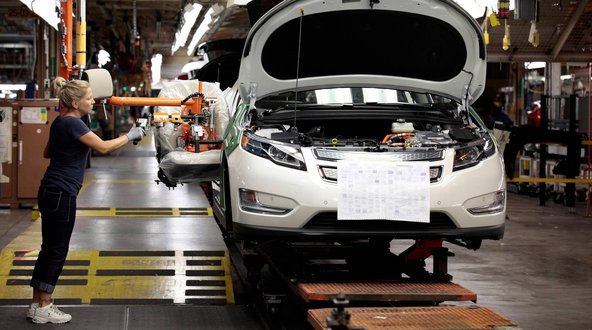 Rebecca Cook/ReutersA General Motors plant in Hamtramck, Mich.
Rebecca Cook/ReutersA General Motors plant in Hamtramck, Mich.
10:04 a.m. | Updated
The Treasury Department said on Wednesday that it planned to sell off its entire 32 percent stake in General Motors within 15 months, eliminating another reminder of the bailouts precipitated by the financial crash of 2008.
The news comes a week after the Obama administration completely sold off its entire holdings in the American International Group, one of the most controversial rescues of the market crisis.
According to a plan outlined on Wednesday, the Treasury Department will sell a little less than half of its stake, or 200 million shares, back to General Motors for $5.5 billion by year end. The purchase price of $27.50 is about 8 percent higher than the car maker’s closing price on Tuesday.
Related Links
The Treasury Department will then sell its remaining 300.1 million shares within the next year to 15 months, depending on market conditions. Those sales could be through stock offerings or other means.
“This announcement is an important step in bringing closure to the successful auto industry rescue, it further removes the perception of government ownership of G.M. among customers, and it demonstrates confidence in G.M.’s progress and our future,” Dan Akerson, the car maker’s chairman and chief executive, said in a statement.
The Obama administration has moved quickly in the past few months to unwind some of the most contentious bailouts struck in recent years.
It stepped in and helped rescue both G.M. and Chrysler in the middle of 2009, as the two American car makers struggled to survive amid the economic downturn. Hoping to forestall a liquidation that the government said would more than 1 million of jobs, the Treasury Department provided financing to the two car makers and to Ally Financial, G.M.’s former financing arm.
Ultimately, the administration invested about $49.5 billion in G.M., helping guide the company through a relatively quick Chapter 11 filing that shed an enormous amount of its debt load. It re-emerged as a public company in late 2010.
Since then, it has performed fairly well, having reported rising annual profits for the past two years. The company’s health has improved to the point that it is growing parts of its business, notably by creating a new internal lending arm with two acquisitions worth $7.7 billion.
G.M. said that its strong balance sheet — with about $32 billion in cash and equivalents as of Sept. 30 — paved the way for the latest stock buyback.
The Obama administration and G.M. have repeatedly emphasized the need to restoring the company as a fully private enterprise, worried that the taxpayer-financed bailout might hurt its ability to compete in the market place. Indeed, G.M. initially garnered the nickname “Government Motors” after word of its impending bailout emerged.
“The government should not be in the business of owning stakes in private companies for an indefinite period of time,” Timothy G. Massad, the Treasury Department’s assistant secretary for financial stability, said in a statement. “Moving to exit our investment in G.M. within the next 12 to 15 months is consistent with our dual goals of winding down TARP as soon as practicable and protecting taxpayer interests.”
The Treasury Department has already divested its stake in Chrysler, selling it last year to Fiat, the Italian car maker that had been a crucial ally during the American company’s bankruptcy.
The government still owns about 74 percent of Ally, though it has recovered about $5.9 billion of its investment in the lender.
Unlike the A.I.G. rescue, however, the government’s wind-down of its G.M. bailout is expected to lose money. The Treasury Department’s break-even pricepoint is generally estimated at about $53 a share, following the car maker’s I.P.O.
But the Treasury Department has long argued that the auto makers’ bailout was always expected to be unprofitable, offset by both the A.I.G. rescue and the bank recapitalization program.
Shares in G.M. were up 5.7 percent in early morning trading, at $26.93.
Article source: http://dealbook.nytimes.com/2012/12/19/treasury-to-sell-g-m-stake-within-15-months/?partner=rss&emc=rss
Speak Your Mind
You must be logged in to post a comment.